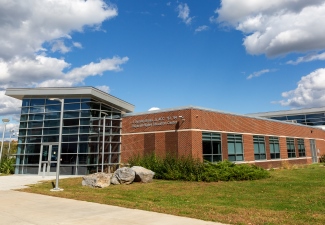SUNY Plattsburgh's Teachers Education Programs Earn National Accreditation
PLATTSBURGH, N.Y. (Oct. 22, 2009) -- The Teacher Education Accreditation Council announced this week that it is granting SUNY Plattsburgh's teacher education programs accreditation for five years - the highest number of years that the accrediting body will give to a first-time applicant. "This is a significant achievement, and one which represents the work of many, many individuals -- individuals who went above and beyond just simply doing what the accrediting body required," said SUNY Plattsburgh President John Ettling. "Instead, our teaching faculty had as their guide a desire to do what is right for our students."
The announcement follows a detailed audit of the college's teacher education programs, which found them to be "above standard" in all categories listed: Candidate Learning, Faculty Learning, and Capacity and Commitment.
It also follows a reorganization of the college's teacher education unit - one which resulted in curricula that are unified by nine teaching themes; that utilize an inquiry-based approach to instruction; and that have students working as adults in the classroom as early as the first semester of their freshman year.
Teacher education has been a mainstay at SUNY Plattsburgh, since the college was originally founded to educate and prepare students for careers in the classroom. Over the years, the teacher education programs have produced 25 percent of the college's graduates.
According to Dr. David Hill, the dean of education, health and human services, the TEAC accreditation, reaffirms the work faculty has been doing in upgrading the program.
"We've worked hard to make innovations in our program so that we can prepare teachers for tomorrow, and that can't help but make a difference to our children," said Hill.
"Today's teachers must learn to navigate the complexities of the classroom," he added. They must be able to deal with rapid changes, like the fact that the technology they use today may be obsolete tomorrow. They need to know their content in depth, but they also need to know how to shift focus when that content becomes irrelevant. And they need to be able to adapt everything they do for the unique needs of learners in the classroom.
In order to address these needs, the faculty worked as a team and researched current best practices in the field, said Dr. Bob Ackland, program area coordinator. This research was boiled down into a list of themes upon which all of their activities were to be based.
These themes promote the knowledge of content, learning environments and technology;
the knowledge of the art and science behind teaching with an emphasis on assessment,
critical thinking, problem solving and recursive learning; and the adaptation of professional
skills such as collaboration, modeling and honoring multiculturalism and diversity.
Once the themes were agreed upon, faculty members worked together to develop systems
to monitor the effectiveness of their instruction - something they are also asking
their students to do in their own teaching. Now, as faculty members teach, they are
continuously assessing what is working and what is not and making improvements.
Faculty members are checking to see if their students feel they are part of a learning community. They are also doing research to determine the impact these feelings might have on student performance. Furthermore, they are exploring the impact of early field placements; the amount of time faculty members spend at area schools; and whether or not program graduates are applying what they've learned in terms of best practices.
According to Hill, faculty members are not only proud of the accreditation, they are proud of the work they are doing.
"This research has invigorated the faculty," said Dr. Heidi Schnackenberg, a program area coordinators in the teacher education unit.
Dr. Denise Simard, a fellow program coordinator, agreed. "I do feel there is a genuine
passion about this inquiry approach to the teaching and learning process."
News
SUNY Plattsburgh, NCCC Announce New Admissions Initiative

SUNY Adirondack Students Benefit from New Dual Agreement with SUNY Plattsburgh Queensbury
